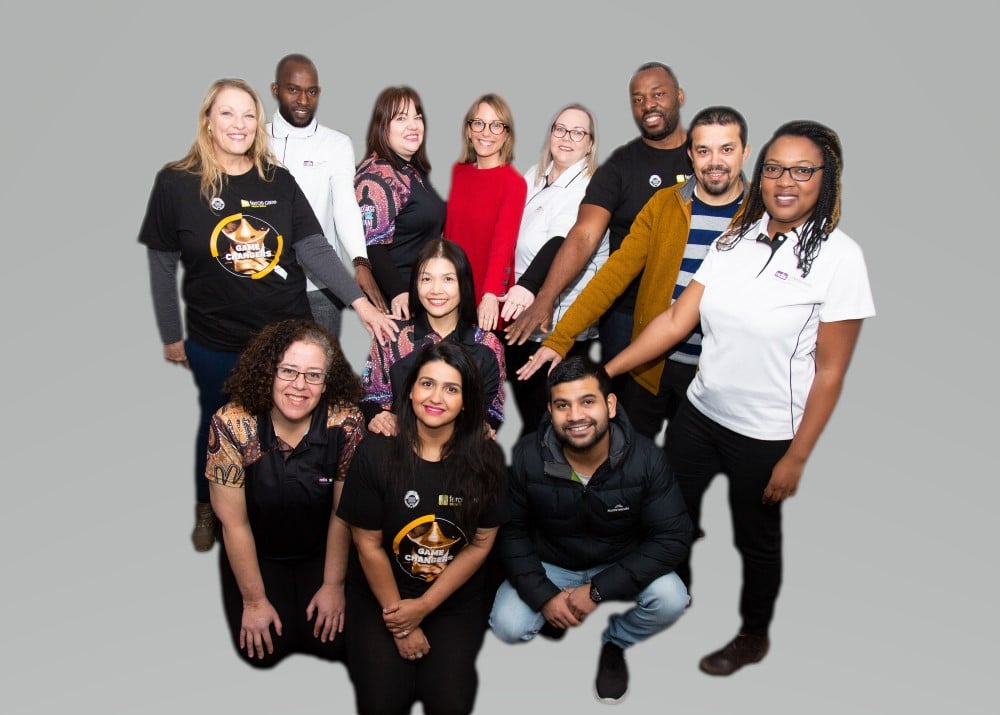
Language of inclusion connects cultures for film project first
WHEN SEARCHING FOR WAYS TO REACH OUT TO A MELTING POT OF CULTURES IN ADELAIDE, A CULTURALLY AND LINGUISTICALLY DIVERSE (CALD) PATHWAYS FILM PROJECT IS PROVING A PERFECT WAY TO BREAK DOWN BARRIERS FOR FEROS CARE.
The project, filmed in partnership with Community Access and Services SA (CAASSA), features videos recorded in 15 languages through the help of seven multi-lingual Feros Care Local Area Coordinators (LACs), and CAASSA case workers, who provided voice over
and translation support.
Sparked through the limitation of face-to-face contact in the current climate, Feros Care Community Development Coordinator (CDC) Anita Smith said the project focused on the facts and fictions of the National Disability Insurance Scheme (NDIS), while
debunking myths and misconceptions by circulating information in communities’ first languages.
“We address the role of the LAC by personalising a script of ‘who’s your Local Area Coordinator’, to explain the process of pre-planning meetings and how LACs support people in connecting with services and their community,”
Anita said.
FEROS CARE LACS COME FROM MANY BACKGROUNDS AND CULTURES
“We wanted to be creative and create something that would be beneficial for people ongoing and not just in the current climate. It’s amazing how our LACs from diverse backgrounds supported the project by sharing their language skills to translate
and articulate information.
Carefully devised by Anita and CAASSA’s Katherine Greer over a six-week period, the project features 15 films with the same scripting, but spoken in languages including Vietnamese, Portuguese, Croatian, French, Zande, South Sudanese, Nepali,
Kirundi, Arabic, Creole, Hindi, Punjabi, Bahasa Indonesian, Shona, and English.
Devised in consultation with various community leaders, Katherine said the films’ explanation of key details such as how NDIS planning meetings will look, what will be discussed, and what supports are available.
Although the NDIS provides translated written information, the
project marks a visual first, proving crucial for those from CALD backgrounds, who advised not all members throughout their various communities had had the privilege of schooling and learning to read.
“When we went and did questionnaires with various communities on what they needed to know, their leaders identified they wanted to know more about LACs and their role,” Katherine said.
“This way, they’ll be able to get key information straight from LACs themselves, who’ll break down all the terminology, so people can piece it all together.
‘We’ve also spoken about it being a potential resource for interpreters, as they can listen for the terms used and use it as an educational tool.”
CALD PROJECTS CONNECT A DIVERSE GROUP OF PEOPLE
On top of consultation with community leaders, the project not only incorporates diversity in front of the camera, but also behind it.
Wanting to provide support in as many ways as possible, Anita said the inclusive nature of the project connected with Butanese videographers from 2 Star Filming, who perfectly captured the vision.
“After arriving in Australia about 7-8 years ago, they went off to university and studied, and they want to build up their videographer name,” Anita said.
“We wanted to show our support, so we thought filming the project would be a great opportunity for them, and they did such an amazing job.”
Katherine said the potential for the project was “huge”, with the opportunity to reach such a diverse spread of the wider community.
Setting a new benchmark, Katherine was hopeful CAASSA and Feros Care could continue to partner up on an ongoing basis.
“Hopefully in future, we can work together again and do some filming around stigma and disability,” she said.